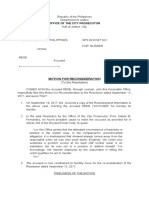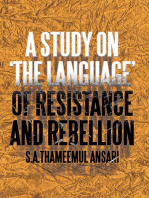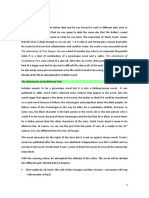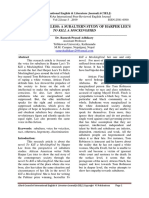0 ratings0% found this document useful (0 votes)
7 viewsEnglish Literature Project
English Literature Project
Uploaded by
jhaashish08.06.07ISC 2025 Pattern
Copyright:
© All Rights Reserved
Available Formats
Download as PDF, TXT or read online from Scribd
English Literature Project
English Literature Project
Uploaded by
jhaashish08.06.070 ratings0% found this document useful (0 votes)
7 views6 pagesISC 2025 Pattern
Original Title
English Literature project
Copyright
© © All Rights Reserved
Available Formats
PDF, TXT or read online from Scribd
Share this document
Did you find this document useful?
Is this content inappropriate?
ISC 2025 Pattern
Copyright:
© All Rights Reserved
Available Formats
Download as PDF, TXT or read online from Scribd
Download as pdf or txt
0 ratings0% found this document useful (0 votes)
7 views6 pagesEnglish Literature Project
English Literature Project
Uploaded by
jhaashish08.06.07ISC 2025 Pattern
Copyright:
© All Rights Reserved
Available Formats
Download as PDF, TXT or read online from Scribd
Download as pdf or txt
You are on page 1of 6
English Literature project
Name: Ashish Jha
Grade: 12
Div: C
Roll no.: 4
How does Wole Soyinka use the medium of a telephone conversation
in his play "Telephone Conversation" to highlight the theme of racial
prejudice?
This question encourages me for exploring of how Wole Soyinka uses
the structure and dynamics of the telephone conversation to expose
and critique the irrationality of racism.
Wole Soyinka's "Telephone Conversation" tackles several significant
themes, primarily through its sharp dialogue and the absurdity of the
situation. Here are the key themes:
1. Racial Prejudice and Discrimination: The primary theme is the
irrationality and absurdity of racial prejudice. The play highlights
how deeply ingrained and irrational racism can be, particularly
through the landlady’s reaction when she discovers the caller's
race.
2. Identity and Stereotyping: The play explores how racial identity
is perceived and stereotyped. The landlady’s response reflects
her preconceived notions and biases about race, revealing how
superficial and damaging such stereotypes can be.
3. Communication and Misunderstanding: The telephone
conversation itself serves as a metaphor for communication
barriers. The misunderstanding and lack of genuine dialogue
between the caller and the landlady reflect broader issues of
miscommunication and the challenges of truly understanding
one another.
4. Social Class and Privilege: Although the focus is on racial
prejudice, the play also touches on themes of social class and
privilege. The landlady’s attitude reveals an underlying sense of
superiority and entitlement, which intersects with her racial
prejudice.
5. Absurdity and Satire: The play uses satire to underscore the
absurdity of racism. The exaggerated and humorous elements of
the conversation highlight how irrational and baseless racial
prejudices can be.
These themes are interwoven throughout the play, creating a powerful
commentary on the nature of racism and the complexities of human
interactions.
In "Telephone Conversation," the two main characters are:
1. The Nigerian Man (the Caller):
Characteristics:
Polite and Courteous: He maintains a respectful and composed
demeanor throughout the conversation, despite the racial prejudice
he encounters.
Confident: He is assured of his right to inquire about the apartment
and doesn’t let the landlady’s prejudiced comments completely
undermine his dignity.
Assertive: He responds directly to the landlady’s queries and
challenges her discriminatory assumptions with a blend of humor and
firmness.
Victimized: His primary role in the play is to reveal the impact of racism
on the individual level, showcasing how his identity and worth are
diminished by the landlady’s prejudice.
2. The British Landlady:
Characteristics:
Racist and Prejudiced: Her reaction to the Nigerian man’s race
highlights her deep-seated racial biases. Her attitude shifts from
welcoming to dismissive once she learns the caller’s race.
Condescending: She exhibits a sense of superiority and entitlement,
assuming that she has the right to judge potential tenants based on
racial prejudices.
Superficial: Her concerns about the Nigerian man's race rather than
his qualifications for renting the apartment reveal a shallow
understanding of individuals, focusing on race rather than character or
capability.
Insecure: Her reaction can also be seen as a reflection of her own
insecurities and societal influences that shape her prejudiced views.
The interaction between these two characters is central to the play’s
critique of racism, illustrating how prejudice can pervade even
mundane situations like renting an apartment.
Wole Soyinka, born on July 13, 1934, in Abeokuta, Nigeria, is a
prominent Nigerian playwright, poet, essayist, and critic. His historical
and cultural background is rich and multifaceted, influencing his
literary works and activism. Here are some key aspects of his
background:
1. Early Life:
Colonial Nigeria: Soyinka grew up during the period of British colonial
rule in Nigeria. This colonial backdrop deeply impacted his views on
politics, identity, and social justice.
2. Political Activism:
Anti-Colonial and Anti-Dictatorial Stance: Soyinka was an outspoken
critic of colonial rule and later, various Nigerian military regimes. His
activism often put him at odds with political authorities, leading to
several periods of imprisonment and exile.
Role in Nigerian Politics: He was actively involved in Nigerian politics,
advocating for democratic governance and human rights. His political
engagement is reflected in his literary works and public speeches.
4. Literary Contributions:
Diverse Genres: Soyinka’s work spans various genres, including drama,
poetry, and prose. His plays, such as "A Dance of the Forests," "The
Man Died," and "Death and the King's Horseman," explore themes of
tradition, colonialism, and social justice.
Influence of Yoruba Culture: Yoruba mythology, religion, and
traditional practices are prominent in Soyinka’s work. His plays often
incorporate traditional Yoruba elements to address contemporary
issues.
5. Nobel Prize:
Nobel Laureate: In 1986, Soyinka became the first African laureate of
the Nobel Prize in Literature. This recognition was due to his work’s
profound impact on literature and his commitment to social and
political justice.
6. Cultural and Intellectual Influence:
Global Impact: Soyinka’s writing and activism have had a significant
influence on both African and global literary and political landscapes.
His works are studied and revered for their exploration of African
identity, colonialism, and the complexities of modern Nigerian society.
Soyinka's background reflects a blend of traditional Yoruba heritage
and modern influences, with a deep engagement in the political and
social issues of his time. This unique combination of experiences has
profoundly shaped his literary voice and his contributions to global
literature and political discourse.
The poem begins with the African man seeking to rent a flat. He calls
a potential landlady, who is initially polite and accommodating.
However, the tone of the conversation changes when the man
reveals that he is African. The landlady awkwardly asks about the
color of his skin, showing her racist attitude. The man responds
sarcastically, describing various shades of his skin, from his face to
the soles of his feet, highlighting the absurdity of her question. The
conversation ends with a palpable tension, leaving the reader to
reflect on the deep-seated racism in society.
The alternate ending for this poem could be After the African man
sarcastically describes the different shades of his skin, the landlady,
sensing his frustration, tries to backtrack, awkwardly stating that she
didn't mean to offend and that she is just "being cautious." The man
pauses, then calmly says, "I appreciate your honesty, but I deserve to
live in a place where I’m judged by my character, not my
complexion." He politely ends the conversation, choosing not to rent
from her, and walks away with his dignity intact.
As he hangs up, the landlady is left in silence, staring at the phone,
reflecting on her own prejudices. The man, on the other hand, feels a
sense of empowerment, knowing that he has stood up for himself.
He walks out into the vibrant city, determined to find a home where
he is welcomed for who he is, not just for the colour of his skin.
You might also like
- ENG1501 Assignment 3 UNISA 2022: Marius Regardt Nel Student Number: 36205192 ID: 8208165067084 Assignment NumberDocument10 pagesENG1501 Assignment 3 UNISA 2022: Marius Regardt Nel Student Number: 36205192 ID: 8208165067084 Assignment NumberMarkusNo ratings yet
- Motion For Reconsideration (OCP)Document4 pagesMotion For Reconsideration (OCP)adelainezernagmail.com100% (7)
- Salman Rushdie's FuryDocument10 pagesSalman Rushdie's FuryadinapoeNo ratings yet
- Arrangement in Black and White by Dorothy ParkerDocument2 pagesArrangement in Black and White by Dorothy ParkerHelen Svetlova100% (1)
- CSEC Poetry NotesDocument29 pagesCSEC Poetry NotesAriana EmmanuelNo ratings yet
- Blackout Is A Short Story by Roger Mais It Is Set in Jamaica and Is About RDocument3 pagesBlackout Is A Short Story by Roger Mais It Is Set in Jamaica and Is About RDaniella Phillip33% (9)
- English Project IscDocument5 pagesEnglish Project IscManasvi DeshmukhNo ratings yet
- Literature NotesDocument14 pagesLiterature Notesshasumith12No ratings yet
- Poems and ProseDocument11 pagesPoems and ProsePareen5100% (1)
- Telephone ConversationDocument7 pagesTelephone Conversation4zhbb4szkpNo ratings yet
- Sir Joemar AfroDocument6 pagesSir Joemar AfrolawasninyagraceNo ratings yet
- Telephone ConversationDocument6 pagesTelephone ConversationCasseopheia MarañoNo ratings yet
- Telephone Conversation 1Document9 pagesTelephone Conversation 1pratikneetiNo ratings yet
- Telephone Conversation by Wole SoyinkaDocument3 pagesTelephone Conversation by Wole Soyinkawhyname711No ratings yet
- Telephone Conversation by Wole SoyinkaDocument2 pagesTelephone Conversation by Wole SoyinkaTarun sai PradeepNo ratings yet
- Telephone ConversationDocument7 pagesTelephone ConversationJon VaderNo ratings yet
- Telephone ConversationDocument6 pagesTelephone ConversationSANIYA KNo ratings yet
- Analysis of A Telephone Converstaion by Wole SoyinkaDocument2 pagesAnalysis of A Telephone Converstaion by Wole SoyinkaLasya Priya100% (1)
- Telephone Conversation by Wole SoyinkaDocument3 pagesTelephone Conversation by Wole SoyinkaAmalNo ratings yet
- Telephone Conversation World LiteratureDocument1 pageTelephone Conversation World LiteratureLloydDagsilNo ratings yet
- RacismDocument5 pagesRacismSarahNo ratings yet
- MulticulturalismDocument9 pagesMulticulturalismShraddha SangoleNo ratings yet
- Doctor, Ron Ian HDocument1 pageDoctor, Ron Ian HRon Ian DctorNo ratings yet
- English Assessment Term 2Document3 pagesEnglish Assessment Term 2api-412292584No ratings yet
- CSEC Poetry NotesDocument29 pagesCSEC Poetry Notesmatthew Williams97% (37)
- English - II Project by PrateekDocument7 pagesEnglish - II Project by PrateekBlackster GamingNo ratings yet
- Women's WritingDocument11 pagesWomen's Writingyashalnoor01No ratings yet
- Telephoneconversation 110907021106 Phpapp01 PDFDocument22 pagesTelephoneconversation 110907021106 Phpapp01 PDFRaquelNo ratings yet
- Arrangement in Black and White by Dorothy ParkerDocument2 pagesArrangement in Black and White by Dorothy ParkersherryNo ratings yet
- Telephone ConversationDocument4 pagesTelephone ConversationAnshuman Tagore67% (3)
- Invisible ManDocument16 pagesInvisible ManFaaiz0% (1)
- Reaction Paper About Telephone ConversationDocument1 pageReaction Paper About Telephone ConversationEdry Dinapo67% (3)
- The Merchant of VeniceDocument23 pagesThe Merchant of VeniceShalu MandiyaNo ratings yet
- Ceremony by Leslie Marmon Silko: Why You'll Like It: About The AuthorDocument2 pagesCeremony by Leslie Marmon Silko: Why You'll Like It: About The Authordon juan goNo ratings yet
- Blackout by Roger MaisDocument3 pagesBlackout by Roger Maisana100% (1)
- Arundhati Roy's - The God of Small ThingsDocument3 pagesArundhati Roy's - The God of Small ThingsSajal ArifNo ratings yet
- BlackoutDocument5 pagesBlackoutTaegan RamsahaiNo ratings yet
- Killing the morning birdDocument11 pagesKilling the morning birdAnunda Robinson MakoriNo ratings yet
- Ambivalence in Toni Morrison's Song of SolomonDocument13 pagesAmbivalence in Toni Morrison's Song of SolomonRiRi BoubaNo ratings yet
- Character Sketch of Important Characters and Their RoleDocument14 pagesCharacter Sketch of Important Characters and Their RoleSantosh KumarNo ratings yet
- Group 5 - To Kill A MockingbirdDocument5 pagesGroup 5 - To Kill A MockingbirdjaneparzugcNo ratings yet
- Second Term Lit - in - EnglishDocument33 pagesSecond Term Lit - in - EnglishoyilskanNo ratings yet
- Character AnalysisDocument4 pagesCharacter AnalysisBaal ComehomeNo ratings yet
- Mark TwainDocument5 pagesMark TwainLidia SNo ratings yet
- Common Wealth Literature PDFDocument112 pagesCommon Wealth Literature PDFJaroos Mohamed50% (4)
- The Bluest EyesDocument34 pagesThe Bluest EyesGLOBAL INFO-TECH KUMBAKONAMNo ratings yet
- Revision Pack para El IBDocument16 pagesRevision Pack para El IBNacho AlvarezNo ratings yet
- To Kill A MockingbirdDocument2 pagesTo Kill A MockingbirdCallie GonzalesNo ratings yet
- Literary ResponseDocument2 pagesLiterary Responseapi-235656654No ratings yet
- English RhapsodyDocument11 pagesEnglish Rhapsodyharshkaiwart08No ratings yet
- To Kill A MockingbirdDocument12 pagesTo Kill A MockingbirdRameshNo ratings yet
- Elephone Conversation: Wole SoyinkaDocument2 pagesElephone Conversation: Wole SoyinkaRahul Kumar SenNo ratings yet
- Wole Soyinka Telephone Conversation NotesDocument3 pagesWole Soyinka Telephone Conversation NotesSWARNAV BISWAS 22212078No ratings yet
- Othello EssayDocument3 pagesOthello EssayJojobaby51714No ratings yet
- To Kill A Mockingbird EssayDocument3 pagesTo Kill A Mockingbird EssaynynztalamNo ratings yet
- To Kill A Mockingbird Racism Thesis StatementDocument7 pagesTo Kill A Mockingbird Racism Thesis Statementpamelawrightvirginiabeach100% (2)
- The Color Purple (1982) by Alice Walker. Final DraftDocument12 pagesThe Color Purple (1982) by Alice Walker. Final Draftnorhansafwat2000No ratings yet
- Wole SoyinksDocument5 pagesWole SoyinksCo CNo ratings yet
- Comedy and DemocracyDocument10 pagesComedy and DemocracyChristopher PaquetteNo ratings yet
- Jurnal 1 SintaDocument22 pagesJurnal 1 SintaCV HUTAMA PUTRANo ratings yet
- Traceability Dashboard - NesteDocument7 pagesTraceability Dashboard - NestejunemrsNo ratings yet
- Nepal National Building Code: Occupancy Load (Imposed Load)Document7 pagesNepal National Building Code: Occupancy Load (Imposed Load)rajjaNo ratings yet
- Genderfuck The Law of The DildoDocument17 pagesGenderfuck The Law of The DildoColin DaileyNo ratings yet
- G.R. No. 188146 - Pilipinas Shell Petroleum Corp. v. Royal Ferry Services, IncDocument10 pagesG.R. No. 188146 - Pilipinas Shell Petroleum Corp. v. Royal Ferry Services, IncmscNo ratings yet
- Summary of ICCPR & ICESCRDocument1 pageSummary of ICCPR & ICESCRsufi9019No ratings yet
- ReportDocument6 pagesReportNicole LuoNo ratings yet
- LEGAL OPINION (Eng)Document11 pagesLEGAL OPINION (Eng)Vic Leonhart MalekeNo ratings yet
- Christina de Bellaigue - Educating Women - Schooling and Identity in England and France, 1800-1867-Oxford University Press, USA (2007)Document293 pagesChristina de Bellaigue - Educating Women - Schooling and Identity in England and France, 1800-1867-Oxford University Press, USA (2007)katherinedantas89No ratings yet
- Slot D ReformationDocument20 pagesSlot D Reformationvaishali RaviNo ratings yet
- XII Pol. Sci. Pre-Board I 2024-25Document6 pagesXII Pol. Sci. Pre-Board I 2024-25GIS, KablanaNo ratings yet
- Risk Management in The Artificial Intelligence ActDocument19 pagesRisk Management in The Artificial Intelligence ActRubo PostoNo ratings yet
- Solution Manual For Corporate Finance 4th Edition by Berk DeMarzo ISBN 013408327X 9780134083278Document36 pagesSolution Manual For Corporate Finance 4th Edition by Berk DeMarzo ISBN 013408327X 9780134083278heathernashdnjbczemra100% (33)
- Zahida Perveen: Career Summary: Position / TitleDocument5 pagesZahida Perveen: Career Summary: Position / TitleHASAN EJAZ KAZMINo ratings yet
- Appeal Memorandum: Civil Service CommissionDocument4 pagesAppeal Memorandum: Civil Service Commissionnoli vergel kirit100% (2)
- Wppil902020 GJHC240256172020 4 23062020Document12 pagesWppil902020 GJHC240256172020 4 23062020DeshGujaratNo ratings yet
- Globalization and MulticulturalDocument15 pagesGlobalization and MulticulturalKhenjeza PornelaNo ratings yet
- Sinn GurublackbookDocument33 pagesSinn Gurublackbookavilashhalder06No ratings yet
- HSC Text Based Vocabulary - ACSDocument153 pagesHSC Text Based Vocabulary - ACSrohob21306No ratings yet
- PSC + ClauseDocument10 pagesPSC + ClauseSankarSinghNo ratings yet
- Ourfamilywizard 5050 223 Free Custody Schedule Template - 0Document23 pagesOurfamilywizard 5050 223 Free Custody Schedule Template - 0Michelle MoretzNo ratings yet
- Vacancy Notice For Legal Officers (AD7), RCT-2021-00149Document8 pagesVacancy Notice For Legal Officers (AD7), RCT-2021-00149Loredana M. LucaNo ratings yet
- AS 4 NotesDocument1 pageAS 4 NotesvendunyasikharpavNo ratings yet
- COMMUNICATION LETTER DRMM-H PlanDocument11 pagesCOMMUNICATION LETTER DRMM-H PlanPen ZerrudoNo ratings yet
- Final M.phil ThesisDocument91 pagesFinal M.phil ThesisramNo ratings yet
- Delphi Motion Defense CostsDocument17 pagesDelphi Motion Defense CostsLeigh EganNo ratings yet
- Renewal Regular Passport Application Form (Adult) : Department of Foreign AffairsDocument2 pagesRenewal Regular Passport Application Form (Adult) : Department of Foreign AffairsabogadieNo ratings yet
- L2 Implied TermsDocument26 pagesL2 Implied Termswstkgb5rf9No ratings yet
- G.R. No. 234808, Nov 19, 2018, Arrieta vs. Arrieta - CIV1-CDDocument2 pagesG.R. No. 234808, Nov 19, 2018, Arrieta vs. Arrieta - CIV1-CDMarnil MagaraoNo ratings yet

























































































